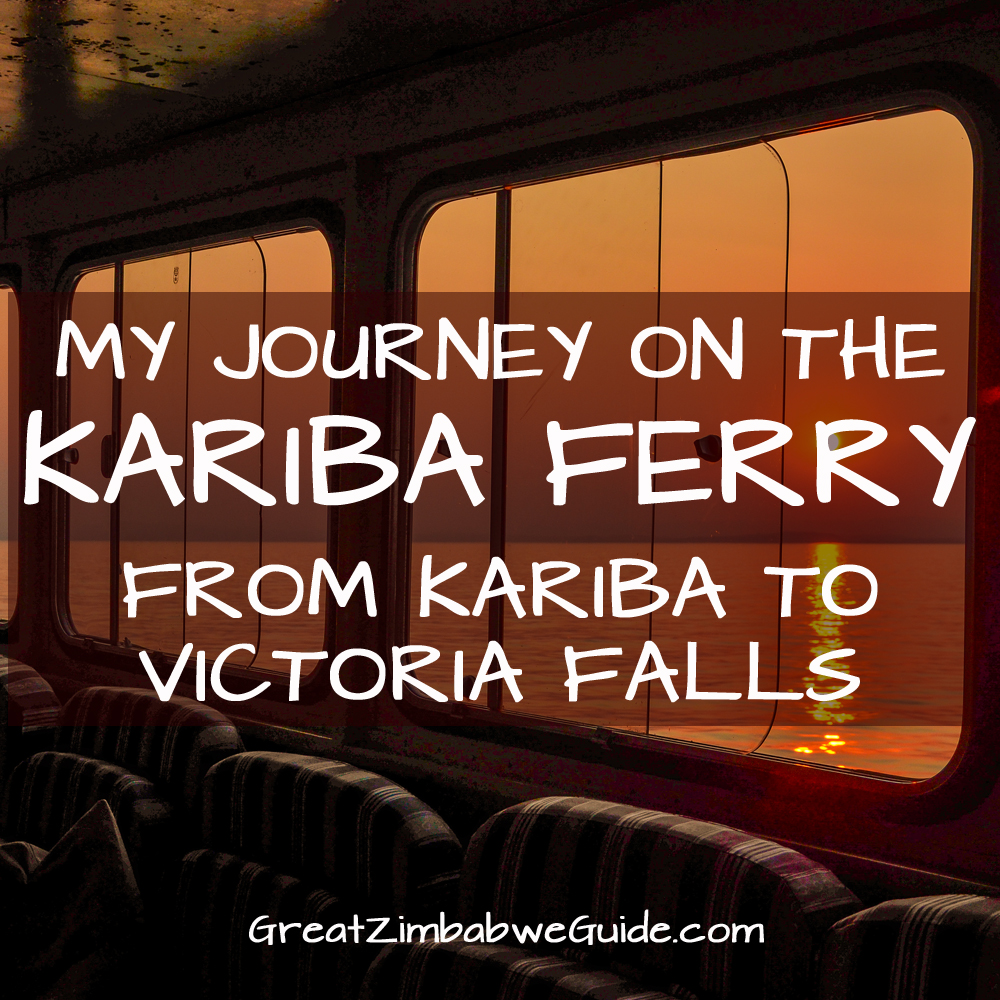
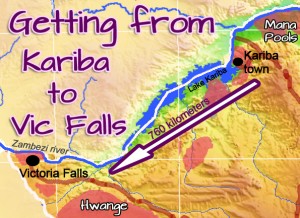 Many people planning a trip around Zimbabwe will face a conundrum: How do I travel between Kariba and Victoria Falls?
Many people planning a trip around Zimbabwe will face a conundrum: How do I travel between Kariba and Victoria Falls?
The roads around the Lake Kariba can be onerous, charter flights can break the budget, so the best option is to travel on the lake itself.
Kariba Ferries have provided a solution in the form of a regular ferry service transporting passengers and vehicles along the length of the lake. Would I rather be sitting in a cramped, hot car, or on the deck of a boat, a drink in hand, looking at an expanse of blue water? Easy answer. Our journey with Kariba Ferries saved a huge amount of driving time and meant that we could relax as a group and enjoy the beautiful scenery of Lake Kariba. It was a well-organised, convenient and enjoyable journey which I can recommend to families and groups of travellers.
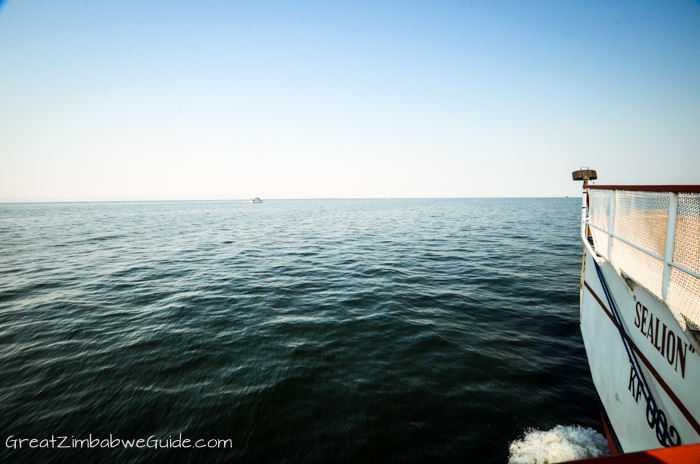
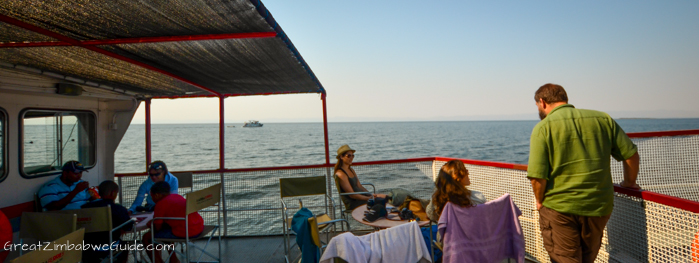
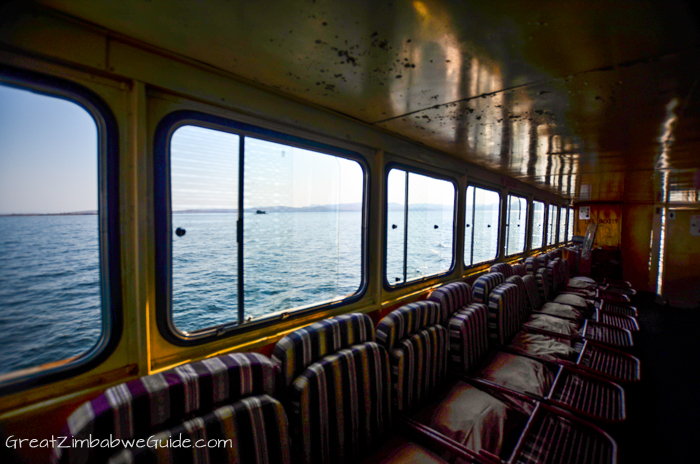
The transport conundrum
Kariba, Mana Pools, Hwange and Victoria Falls are key locations in a Zimbabwean holiday – no tour would be complete without visiting at least two of them. However, there’s no reliable public transport between these northern tourist spots of the country. There are charter air shuttles available, but this can be costly.
For self-drive visitors, there are logistical problems associated with driving between Kariba and Victoria Falls. The road along the southern shore of Lake Kariba is corrugated and untarred: it’s for 4x4s only. The journey is slow: over 600 kilometres (370 miles) at painfully low speeds. Even with a 4×4, it is an arduous, spine-jolting journey. At least one overnight stopover is a must, which adds to the expense, and accommodation options are limited. An alternative driving route is available along the northern shore of the lake, where the road is smoother, but this involves crossing the border into Zambia, which can be time-consuming and problematic for visitors with single-entry visas to Zimbabwe. The northern route is still a long drive with little scenery to make the journey interesting.
The solution
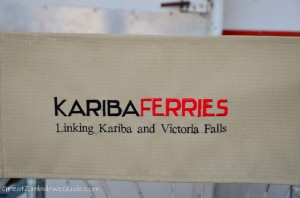 We wanted to visit both Mana Pools and Victoria Falls during our Zimbabwe holiday, and we chose Kariba Ferries as our transport option. Looking back, it was definitely the right decision. The ferry transformed the journey from a mere means of getting somewhere, to a memorable part of the holiday itself. The ferry journey lasted about 22 hours, which sounds long, but is actually about the same length of time (if not less) it would have taken by road, including stopover time. The ferry isn’t a luxurious vessel by any means, but it’s comfortable, well-maintained and fuss-free – and that’s exactly what we needed.
We wanted to visit both Mana Pools and Victoria Falls during our Zimbabwe holiday, and we chose Kariba Ferries as our transport option. Looking back, it was definitely the right decision. The ferry transformed the journey from a mere means of getting somewhere, to a memorable part of the holiday itself. The ferry journey lasted about 22 hours, which sounds long, but is actually about the same length of time (if not less) it would have taken by road, including stopover time. The ferry isn’t a luxurious vessel by any means, but it’s comfortable, well-maintained and fuss-free – and that’s exactly what we needed.
Here are some details of our time with Kariba Ferries in August 2013 – I hope it’ll be useful to anyone considering this route. We were lucky in that there were only 16 people on the ferry when we went, which meant that there was plenty of space to move between the cabin and the deck. If you are travelling during peak times (public holiday weekends), I can imagine the journey would be a little more cramped and less enjoyable.
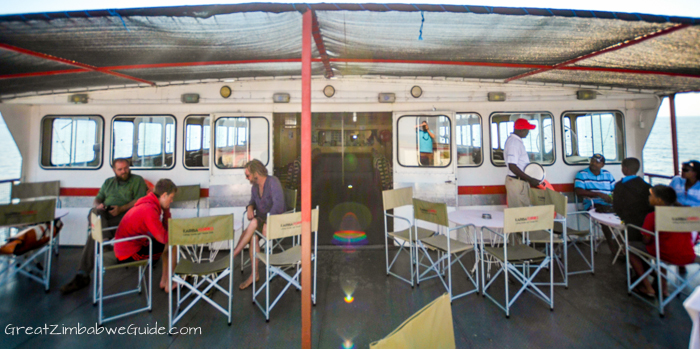
Our journey
Departure
We did the Kariba-Mlibizi route as a group of 4 adults; the ferry also does the Mlibizi-Kariba route. We stayed in Kariba Town the night before to ensure we arrived at the ferry harbour by 8 am. Our car was loaded onto the ferry without fuss and we set sail. After an introduction from the host, we were served tea, coffee and biscuits so we felt well-looked after from the get-go.
The morning was a relaxed affair spent reading in the sun or having a nap in the sheltered cabin. We chatted to the other passengers, spotted wildlife on the lakeshore and marvelled at the huge size of Lake Kariba. Lunch was a simple but wholesome buffet of assorted home-cooked cold meats, salads and breads, followed by cheese & biscuits, tea & coffee.
Not your average afternoon swim
In the late afternoon we had the opportunity to swim in the middle of Lake Kariba. I had serious doubts about this because there are crocodiles and “Zambezi sharks” in the lake. We were persuaded that it was relatively safe: the crocodiles usually stick to the shoreline, and the lake is so enormous that the chances of encountering anything dangerous in the middle are slim.

It was a very hot day, and the idea of having a cooling swim outweighed my worries, and I decided to do it. The water was a lovely temperature – certainly warmer than any swimming pool that we’d been in at that time of year (August, the end of winter). Most surprising, there was a disarmingly strong current, requiring a fair amount of effort to stay close to the boat. The crew attached a rope and some life rings to the back of the boat for any children or weaker swimmers to hold to. There’s something eerie about swimming in something where you can’t see the bottom, but the experience was great – refreshing and invigorating. It was one of those unique experiences that can’t be replicated anywhere else in the world, which I won’t forget.
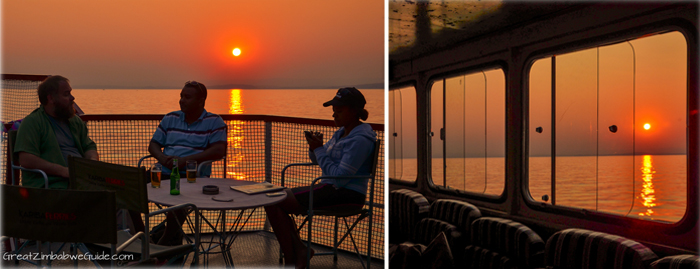
Sunsets on Lake Kariba are particularly spectacular, and the sight of the sun’s flame-orange rays reflecting on the water during this voyage didn’t disappoint. We were given snacks of kapenta (small fish, abundant in the lake) to have with our sundowners – my favourite time of the day.
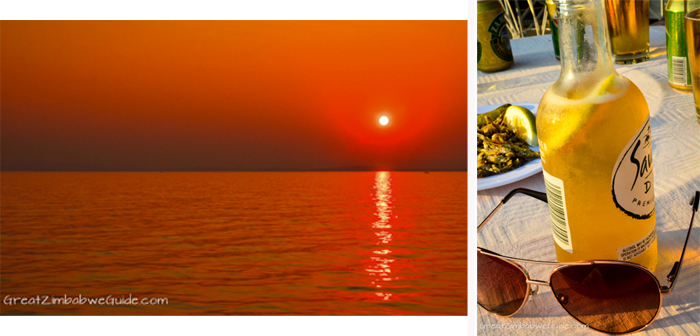
A night under the stars
Dinner was lovely in a postcolonial Zimbabwean way: Roast potatoes, beef, chicken stew, rice, sadza and vegetables. The pudding was a very tasty apple crumble with ice cream or custard. All the food we had on the ferry was home-style fare, cooked to a high standard – it really notched up the value of the journey, as did our sociable host and the friendly staff.
The sleeping area is communal, and we could sleep out on the deck or in the large cabin. There are ample, well-padded chair-beds which fold out to be completely horizontal. Alternatively there are some thick mattresses available and we chose those. We wanted to sleep under the stars, so we put the mattresses on the floor of the deck. Warm blankets and pillows were provided, so we made a cosy nest and settled down for the night. The ferry keeps travelling throughout the night so the sound of the engine continued, but this didn’t stop me from getting a good night’s sleep.
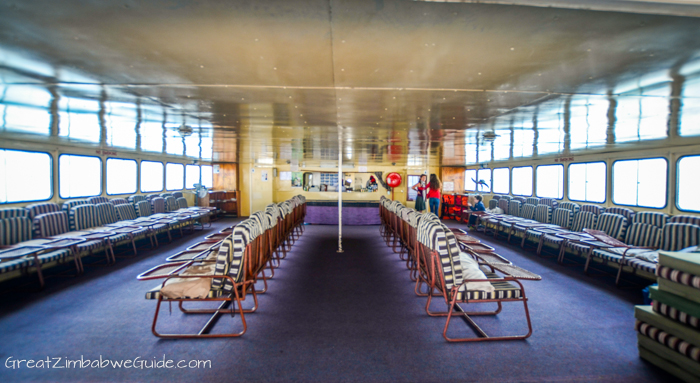
Waking up on the lake
Breakfast was my favourite meal of the voyage: cereal, porridge, bacon, eggs, sausage, toast, tomatoes: the works. We had the pleasure of witnessing the sunrise, and we arrived at Mlibizi at 7am. There wasn’t much sign of habitation at Mlibizi except a ramp for the cars to offload to, and a group of local children on the shore curiously studying the ferry. Our car was quickly offloaded and we set off on the (tarred) road, arriving at Victoria Falls within 3 hours.
Our time on the ferry definitely met all the requirements: the journey was trouble-free, the staff were efficient, the food was tasty and the boat was well-maintained. Although the ferry won’t win any prizes in a beauty contest, it does win the prize for good value and peace of mind.
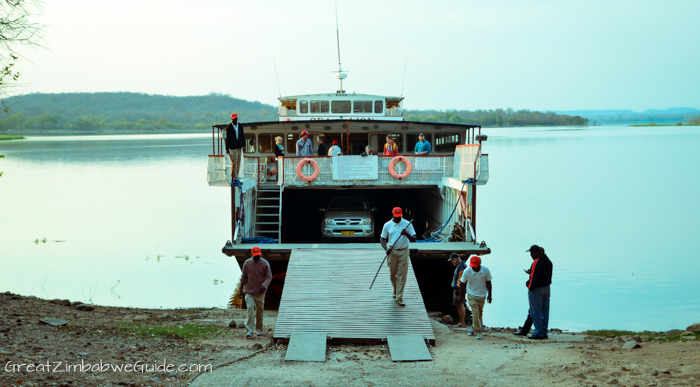
Practical details
- Three meals (lunch, dinner and breakfast) plus tea and coffee are included in the ferry fee.
- There is a cash bar on board to buy soft drinks, beers, wine, chocolates, crisps etc.
- The ferry fee excludes National Parks fees which costed approx. US$10 for visitors and US$5 for locals in August 2013.
- Passengers should leave their large belongings in their vehicles or in the hold, and pack an overnight bag for the ferry journey.
- Recommended items for the overnight bag: A change of day clothes, fleece jacket, sleepwear (it can be chilly at night so bring a tracksuit), swimming costume, microfibre towel, toiletries, prescription medicines, binoculars, reading material, board games, hat, sunglasses, sunblock, mosquito repellent, US Dollars (small denominations) to buy drinks, a water bottle, and a sleeping bag/pillow if you choose not to use the bedding supplied by the ferry.
- The ferry can carry up to 65 passengers and 13-15 vehicles dependant on average size on its scheduled service.
- Toilets and hot showers are available on board.
- The ferry fee in August 2013 was US$160 per adult.
- See the Kariba Ferries website for more.
If you’re not self-driving, discuss shuttle options with your hotels in Kariba and Victoria Falls. Your hotel in Kariba would probably be happy to provide a shuttle to drop you off at the Kariba harbour. Equally, your hotel in Victoria Falls could send a shuttle to pick you up from Mlibizi and bring your to Victoria Falls. There isn’t any reliable public transport between Mlibizi and Victoria Falls.
This post is proudly sponsored by Kariba Car Ferry Service. Sponsored posts are written with the understanding that the writer can express her opinions honestly and openly. I truly enjoyed my experience on the Kariba Ferry and would recommend it highly.
“Save time, fuel, money, frayed nerves, over 1250kms of driving and at least one night’s hotel stop by taking your car the length of the lake, using the Kariba Car Ferry Service.”
Part of the Classic Zimbabwe holiday 2013 series. Read the next post where we go to a beautiful eco-lodge: Victoria Falls Safari Lodge: An Introduction
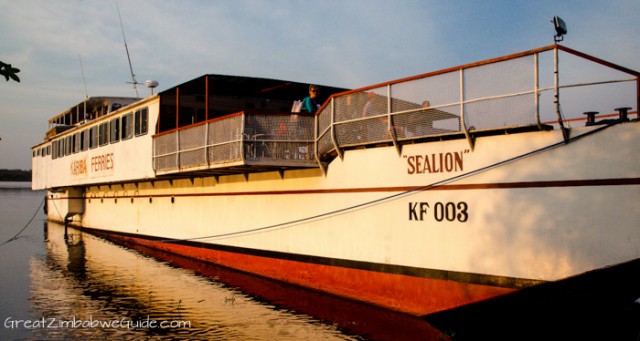
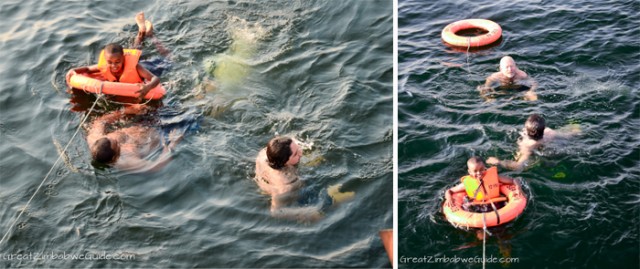
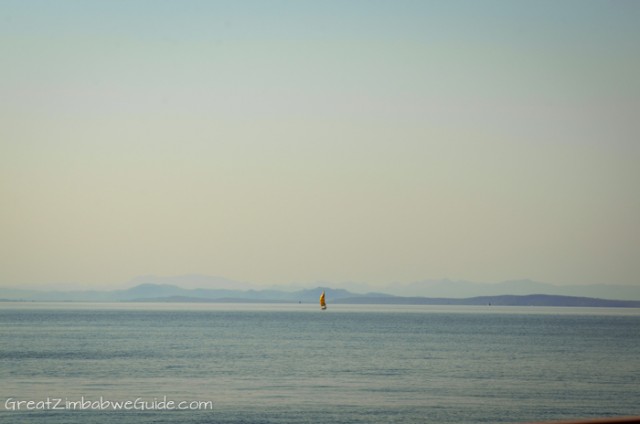
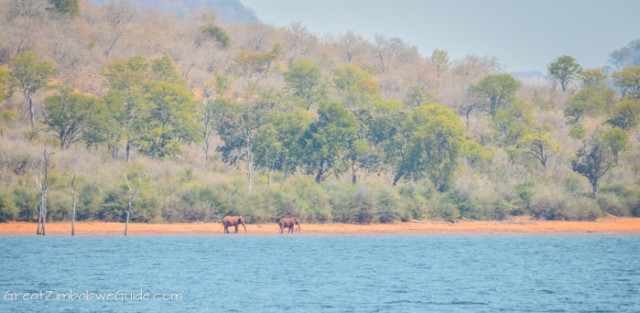

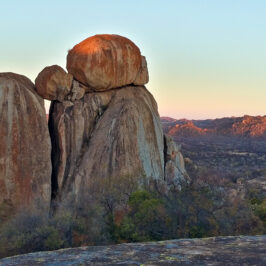
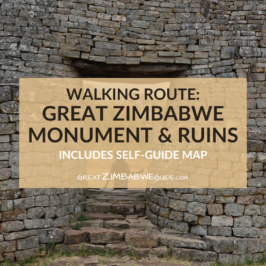
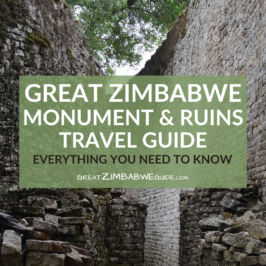
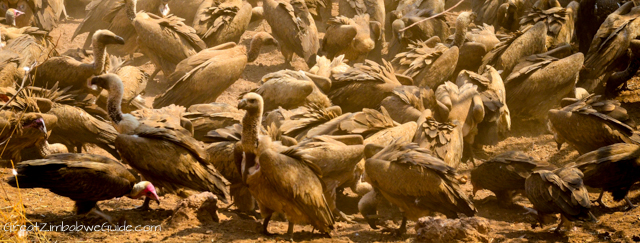
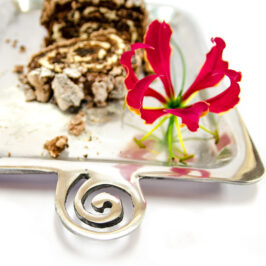
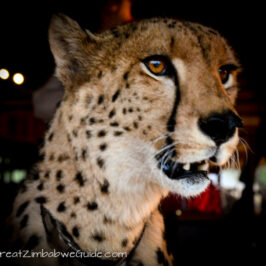
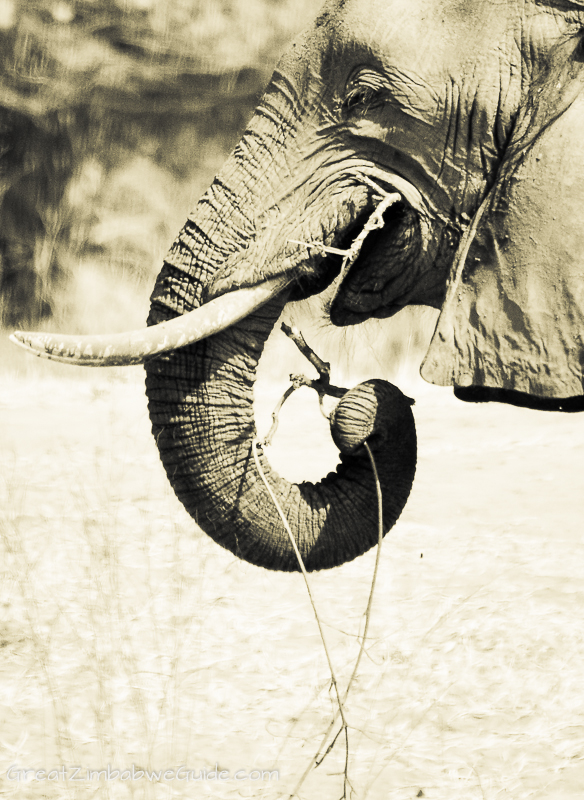
Samantha Belliere
hello, what time of the year did you travel on the ferry? What was the feel of the water – calm/rough/much movement? We are considering it as a means of getting from Mana pools to Vic Falls but have one in our party who suffers from quite severe motion sickness.
Many thanks!